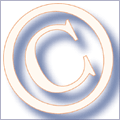
 |
Do You Know Your Rights as an Author?
 Are you aware that you may be prohibited from posting
your own published articles on your course website?
Do you know whether you are permitted to re-use
material from a previously-published article in
the book chapter you are writing? Do you have the right
to distribute to colleagues your own articles published
in electronic journals licensed by the UCI
Libraries? A new UCI Libraries workshop for faculty, part
of our Scholarly Communication and Management Program
(SCAMP), will provide the answers.
Are you aware that you may be prohibited from posting
your own published articles on your course website?
Do you know whether you are permitted to re-use
material from a previously-published article in
the book chapter you are writing? Do you have the right
to distribute to colleagues your own articles published
in electronic journals licensed by the UCI
Libraries? A new UCI Libraries workshop for faculty, part
of our Scholarly Communication and Management Program
(SCAMP), will provide the answers.
The Libraries' SCAMP program is developing a hands-on workshop to explore your options as an author for proactively managing your own intellectual property (i.e., your copyrights). The workshop will be piloted with faculty in the College of Medicine in spring 2004 and will be made available to faculty in other schools in future months. Participants will review sample copyright assignment agreements from a range of publishers and discuss alternatives in both language and content for potential use in future agreements. Faculty will be encouraged to bring copies of their existing publication contracts for analysis during the workshop.
The norm in scholarly publishing has long been for authors to assign exclusive perpetual intellectual property rights to publishers in return for publication of their work. The transfer of copyright from author to publisher is designed to help protect authors from infringement or plagiarism by third parties, in return for the economic investment that the publisher makes in editing, archiving and distributing scholarly content.
As readers of Update are well aware, however, scholarly communication norms are in active ferment. Awareness has grown in recent years of the needless restrictions imposed by publishers for an author's re-use of her own writings for instructional and other scholarly purposes. Moreover, the rise of public repositories and digital archives operated by educational institutions and learned societies has increased scholars' interest in sharing their work outside conventional scholarly publishing channels. As a result, both authors and publishers are now experimenting with alternative licensing language that will allow authors to retain more control over their own intellectual property.
In seeking such changes, the view of the academy is that current licensing norms may impede, rather than enhance, the sharing of new knowledge by establishing restrictions that enable private economic gain while disabling reasonable, broad access for the common good. Some intellectual property rights should remain with authors and universities.
For more information consult the SCAMP website
at www.lib.uci.edu/scamp/authors.html
or
contact Carol Hughes (Hughes@uci.edu or
x49753).
|